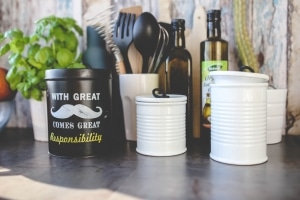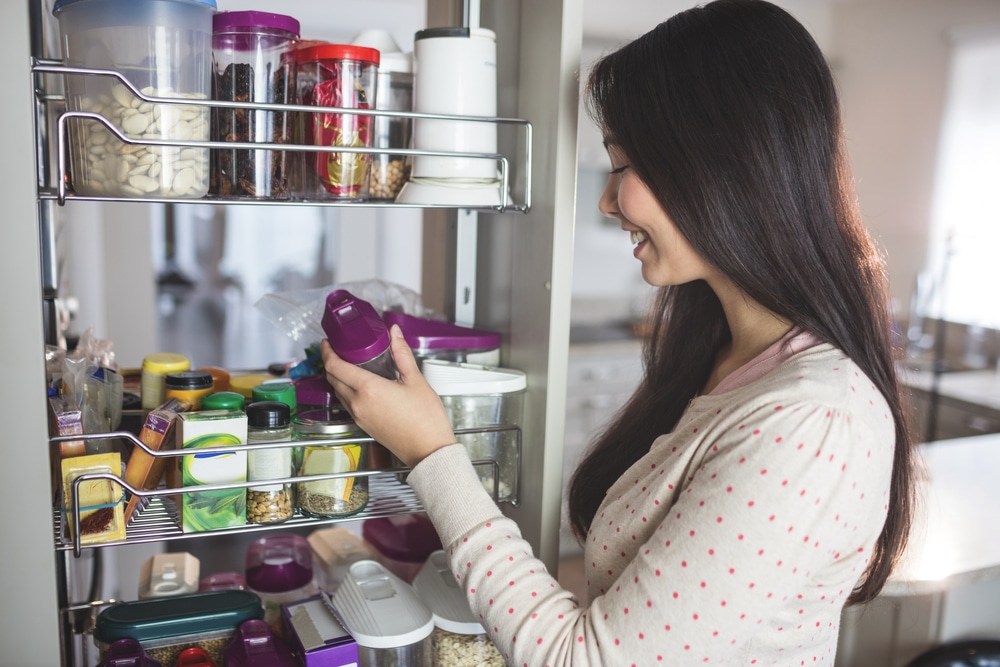Declutter – how it could help you to lose weight

Declutter and lose weight. Sounds weird? Well, read on because there is a connection between extra stuff around your home and extra stuff around your waistline!
Clutter is a state of mind and it can pervade all areas of your life, including your body.
- How decluttering can help you to lose weight
- I’m not going to live like this anymore!
- Do a weight-loss declutter exercise
- An uncluttered kitchen keeps you slim
- It’s not your fault
- A slim kitchen
How decluttering can help you to lose weight
Research in recent years (particularly in America where they have the most ‘stuff’ and the highest obesity levels) shows again and again that people who lead cluttered lives in cluttered homes are more likely to be overweight than those who don’t.
American professional organiser, Peter Walsh, author of ‘Lose the Clutter, Lose the Weight’, says that people with cluttered homes are 77% likely to be overweight or obese.
He says he believes people can’t make their best and healthiest choices in a messy and cluttered home. The clutter is literally stopping them thinking straight. His book gives people a system to follow in order to declutter their homes and lose the extra pounds (or stone in many cases).
In an interview with USA today, Walsh said: “I ran a test panel of 25 people through the six-week program and found great results. The average weight loss was 10 pounds, and the amount of stuff that left their homes was close to 40%. And, every single person in the program lost weight. What we found is that for these people getting on top of the clutter in their homes helped them get on top of other issues going on in their lives as well.”
I’m not going to live like this anymore!
Another professional organiser in the States, Lynne Johnson, says she often sees a link between her clients’ efforts to get organised and their weight loss. She says “I think someone decides, ‘I’m not going to live like this anymore. I’m not going to hold onto my stuff, I’m not going to hold onto my weight,’ I don’t know that one comes before the other. It’s part of that same life-change decision.”
Dr. Pamela Peeke, assistant clinical professor of medicine at the University of Maryland is the author of ‘Fit to Live’, in which she also has a section about the link between health and being organised.
She says she often instructs patients trying to lose weight to at least create one clean and uncluttered place in their home.
She also suggests keeping a gym bag with workout clothes and trainers in a part of the house that is uncluttered to make it easier for them to exercise. Sometimes the problem is that basic.
She says that she had one patient whose garage was “a solid cube of clutter.” But the woman cleaned up her home and, in the process, lost nearly four stone.
“It wasn’t, at the end of the day, about her weight,” Dr. Peeke says, “it was about uncluttering at multiple levels of her life.”
It kind of makes sense. Messy homes and messy lives tend to stop us feeling in control which is an unhappy state of thought. Sweet, sugary treats make us feel better, even if only for a moment.
Also, if we feel the need to accumulate to make us feel whole and happy, it’s likely that that will spill over into the way we approach food.
Do a weight-loss declutter exercise
Once you have decided to declutter you are already on your way to losing weight. Just the decision to focus on elements in your life that hold you back will help shift the first few pounds. Here are some places to start:
- First attack genuine rubbish. Go through the junk in your rooms and first take out old papers, bills, empty boxes, bags and other bits that are genuine junk. Throw them out. At the same time, go through your kitchen cupboards and boxes and take out junk food. Give it away or even throw it in the bin (I hate throwing food away but if it’s actually harmful it’s best not to give it away).
 Give yourself space to think. Start with a room that you work in – maybe an office or spare room – and get that cleared. Even remove or rearrange furniture to create space and clarity. You should be able to throw away a lot of books and files, refile and sort other items here. Once you have space here you will have at least once place to feel in control and able to make decisions.
Give yourself space to think. Start with a room that you work in – maybe an office or spare room – and get that cleared. Even remove or rearrange furniture to create space and clarity. You should be able to throw away a lot of books and files, refile and sort other items here. Once you have space here you will have at least once place to feel in control and able to make decisions.- Carry on around the house. This could take a few weeks or even months depending on how many of you are doing it and how much stuff you have. Aim to sell or give a lot away.
- Simplify life. Get into simpler ways of doing things. Possibly even get rid of gadgets that need to be cleaned too often or are too complicated to use. Simplify the food you eat – basic, fresh healthy stuff rather than pre-prepared, fatty stuff.
An uncluttered kitchen keeps you slim
 A new study by the Food and Brand Lab at Cornell University in the States has found that dirty, cluttered and chaotic kitchens can make us eat more unhealthy snacks.
A new study by the Food and Brand Lab at Cornell University in the States has found that dirty, cluttered and chaotic kitchens can make us eat more unhealthy snacks.
In a study using female students at the university, they noted how many biscuits, carrot sticks and crackers were eaten when left in either tidy or messy kitchens. (They were also asked, before entering the kitchen, to write either about situations in which they felt in control, or else about out-of-control situations.)
Although there was no difference in the amount of crackers and carrots eaten, the women in the tidy, in-control kitchens ate fewer biscuits than those in the messy kitchens.
It’s not your fault
 Professor Brian Wansink of Cornell University in the USA has been studying weight for years (have you noticed how all the specialists on weight-related issues are from the States??). He says that our ballooning weight is not entirely our fault. In fact it’s our kitchens, workplaces, favourite restaurants and food shops that are doing it.
Professor Brian Wansink of Cornell University in the USA has been studying weight for years (have you noticed how all the specialists on weight-related issues are from the States??). He says that our ballooning weight is not entirely our fault. In fact it’s our kitchens, workplaces, favourite restaurants and food shops that are doing it.
“In sight, in stomach,” is one of his catchphrases.
He says that restaurants have made it easier to order tasty (fatty) food. Supermarkets have made it easier to buy foods we shouldn’t have but really want. Workplaces have made it easier to eat at our desks. It has all helped to make us ‘fat by design’ he says.
He says we can lose weight by making changes to our environments and habits. One of the ways to do it is to have a tidier kitchen with food out of sight.
A slim kitchen
There are a few things you can do to declutter your kitchen for weight loss:
- Keep cereal in the cupboard. A lot of cereals are high in sugar and if you leave them on the worktop you tend to help yourself when you’re in there. In America it has been worked out that if your kitchen is the first room you walk into, and cereal is out on show, statistically you will weigh two stone – nearly 13kg – more than someone who doesn’t. Amazing huh?
- When you go into the kitchen to put the kettle on…leave. Don’t hang around waiting for it to boil as that is a danger time when you start looking for biscuits.
- Don’t work in the kitchen. Kitchen table earners are a good breed but working at the kitchen table can harm your waistline. “When you get up to stretch your legs and clear your head it can all too easily turn into a stroll to the biscuit tin,” says Jane McCartney of Stopovereating.co.uk. Put your desk in another part of the house if possible.
 Keep the kitchen quite tidy. It gives you a sense of calm and control, so that you can focus. When everything is untidy and burdensome it’s too easy to grab something to comfort you.
Keep the kitchen quite tidy. It gives you a sense of calm and control, so that you can focus. When everything is untidy and burdensome it’s too easy to grab something to comfort you.- Change the colour of your plates to help you eat less. Weirdly, food tastes sweeter on white plates. Even the tone of light you eat under can affect it. According to one research project men ate less for breakfast but were no more hungry when they ate under a blue light.
- Don’t eat in front of the TV. Several studies have shown that people who eat in front of the TV eat 30% more. It’s called ‘distracted eating’.
- Don’t do ‘shared eating’. When eating as a family, try not to let everyone help themselves from a large dish on the table. Apparently we eat 20% less if meals are served up from the stove or worktop. However, if you like to put a big dish on the table, after everyone has served themselves, move it over to the side or back into the kitchen because the problem isn’t the initial serving it’s all the ones after that.
- Avoid the trend for open plan kitchens and kitchen/living rooms (much beloved of London developers). Being able to close the door on food is very useful, so if you’re likely to pick at food you see, have a separate kitchen with a non-glass door!









 Keep the kitchen quite tidy. It gives you a sense of calm and control, so that you can focus. When everything is untidy and burdensome it’s too easy to grab something to comfort you.
Keep the kitchen quite tidy. It gives you a sense of calm and control, so that you can focus. When everything is untidy and burdensome it’s too easy to grab something to comfort you.
